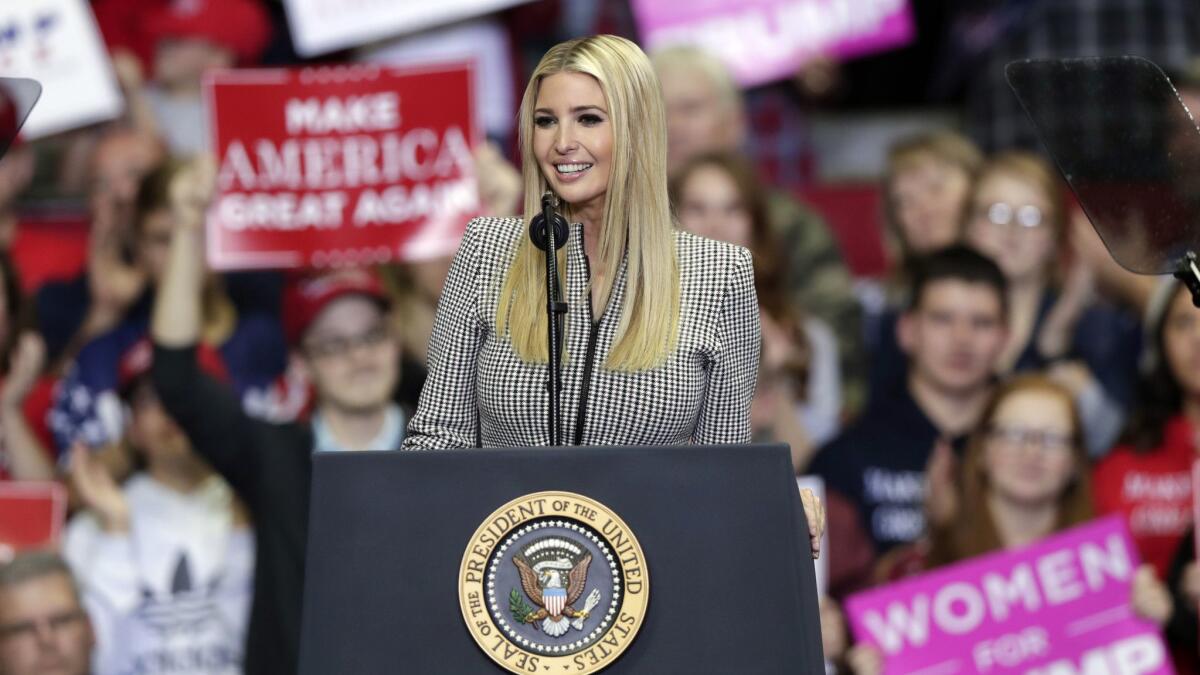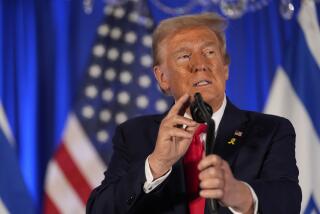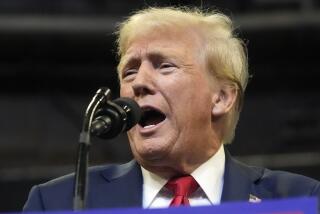Ivanka Trump used personal account to send emails about government business

Ivanka Trump sent hundreds of emails last year to White House aides, Cabinet officials and her assistants using a personal account, many of them in violation of federal records rules, according to people familiar with a White House examination of her correspondence.
White House ethics officials learned of Trump’s repeated use of personal email when reviewing emails gathered last fall by five Cabinet agencies to respond to a public records lawsuit. That review revealed that throughout much of 2017, she often discussed or relayed official White House business using a private email account with a domain that she shares with her husband, Jared Kushner.
The discovery alarmed some advisors to President Trump, who feared that his daughter’s practices bore similarities to the personal email use of Hillary Clinton, an issue he made a focus of his 2016 campaign. Trump attacked his Democratic challenger as untrustworthy and dubbed her “Crooked Hillary” for using a personal email account as secretary of State.
Some aides were startled by the volume of Ivanka Trump’s personal emails — and taken aback by her response when questioned about the practice. Trump said she was not familiar with some details of the rules, according to people with knowledge of her reaction.
The White House referred requests for comment to Ivanka Trump’s attorney and ethics counsel, Abbe Lowell.
In a statement, Peter Mirijanian, a spokesman for Lowell, acknowledged that the president’s daughter occasionally used her private email before she was briefed on the rules, but he said none of her messages contained classified information.
“While transitioning into government, after she was given an official account but until the White House provided her the same guidance they had given others who started before she did, Ms. Trump sometimes used her personal account, almost always for logistics and scheduling concerning her family,” he said in a statement.
Mirijanian said Ivanka Trump turned over all her government-related emails months ago so they could be stored permanently with other White House records.
And he emphasized that her email use was different than that of Clinton, who had a private email server in the basement of her home in Chappaqua, N.Y. At one point, an archive of thousands of Clinton’s emails was deleted by a computer specialist amid a congressional investigation.
“Ms. Trump did not create a private server in her house or office, no classified information was ever included, the account was never transferred at Trump Organization, and no emails were ever deleted,” Mirijanian said.
Like Trump, Clinton also said she was unaware of or misunderstood the rules. However, Clinton relied solely on a private email system as secretary of State, bypassing government servers entirely.
Both Trump and Clinton relied on their personal attorneys to review their private emails and determine which messages should be retained as government records.
Clinton originally said none of the messages she sent or received were “marked classified.” The FBI later determined that 110 emails contained classified information at the time they were sent or received.
Austin Evers, executive director of the liberal watchdog group American Oversight, whose record requests sparked the White House discovery, said it strained credulity that Trump’s daughter did not know that government officials should not use private emails for official business.
“There’s the obvious hypocrisy that her father ran on the misuse of personal email as a central tenet of his campaign,” Evers said. “There is no reasonable suggestion that she didn’t know better. Clearly everyone joining the Trump administration should have been on high alert about personal email use.”
Ivanka Trump and her husband set up personal emails with the domain “ijkfamily.com” through a Microsoft system in December 2016, as they were preparing to move to Washington so Kushner could join the White House, according to people familiar with the arrangement.
The couple’s emails are prescreened by the Trump Organization for security problems such as viruses but are stored by Microsoft, the people said.
Trump used her personal account to discuss government policies and official business less than 100 times — often replying to other administration officials who contacted her through her private email, according to people familiar with the review.
Another category of less-substantive emails may have also violated the records law: hundreds of messages related to her official work schedule and travel details that she sent herself and personal assistants who cared for her children and house, they said.
People close to Ivanka Trump said she never intended to use her private email to shroud her government work. After she told White House lawyers she was unaware that she was breaking any email rules, they discovered that she had not been receiving White House updates and reminders to all staff about prohibited use of private email, according to people familiar with the situation.
Using personal emails for government business could violate the Presidential Records Act, which requires that all official White House communications and records be preserved as a permanent archive of each administration. It can also increase the risk that sensitive government information could be mishandled or hacked, revealing government secrets and risking harm to diplomatic relations and secret operations.
Revelations about Clinton’s personal email system led to an FBI investigation of whether she had mishandled classified information. The scandal shadowed Clinton throughout the 2016 White House race, culminating in then-FBI Director James B. Comey’s controversial decision to hold a news conference a few months before the election to announce his conclusion that she had been reckless with government secrets but that there was not sufficient evidence she had intended to skirt the law.
During the campaign, Donald Trump said the Democratic nominee’s “corruption is on a scale we have never seen before” and called her personal email use “bigger than Watergate.”
Trump supporters still chant “Lock her up!” at his rallies, and the president, nearly two years into his administration, continues to tweet about Clinton’s emails.
“Big story out that the FBI ignored tens of thousands of Crooked Hillary Emails, many of which are REALLY BAD,” he tweeted in August, referring to a Fox News story about claims that the bureau did not scrutinize all her emails. “Also gave false election info. I feel sure that we will soon be getting to the bottom of all of this corruption. At some point I may have to get involved!”
Ivanka Trump first used her personal email to contact Cabinet officials in early 2017, before she joined the White House as an unpaid senior advisor, according to emails obtained by American Oversight.
In late February 2017, she used her personal email to contact Small Business Administration chief Linda McMahon and propose they meet to explore “opportunities to collaborate.” The following month, she emailed Education Secretary Betsy DeVos, suggesting that their staffers meet to discuss ways to collaborate on “locational/workforce development and k-12 STEM education.”
While her messages were largely about government work, Trump was not then subject to White House records rules.
When she joined the White House on March 30, Trump pledged to comply “with all ethics rules,” responding to complaints that her voluntary role gave her all of the access and perks of the White House — but none of the legal responsibilities or constraints.
“Throughout this process I have been working closely and in good faith with the White House counsel and my personal counsel to address the unprecedented nature of my role,” she said in a statement at the time.
But Trump continued to occasionally use her personal email in her official capacity, according to people familiar with the review.
Her husband’s use of personal email for government work drew intense scrutiny when it was first reported by Politico last fall. The revelation prompted demands from congressional investigators that Kushner preserve his records, which his attorney said he had.
But Trump had used her personal email for official business far more frequently, according to people familiar with the administration’s review — a fact that remained a closely held secret inside the White House.
“She was the worst offender in the White House,” said a former senior U.S. government official who spoke on the condition of anonymity to describe internal dynamics.
After discovering the extent of her email use in September 2017, White House lawyers relied on Lowell, Ivanka Trump’s attorney, to help review her personal emails to determine which were personal and which were official business, according to the people.
The White House Counsel’s Office did not have access to her personal account and could not review it without invading her privacy and possibly violating privileged communications with her attorneys, people familiar with the review said.
After his review, Lowell forwarded emails that he had determined were related to official business to Ivanka Trump’s government account, a move he viewed as rectifying any violations of the records law, they said.
Lowell’s review found less than 1,000 personal emails in which Trump shared her official schedule and travel plans with herself and her personal assistants, according to two people familiar with the review.
Separately, there were less than 100 emails in which Trump used her personal account to discuss official business with other administration officials.
Carol D. Leonnig and Josh Dawsey write for the Washington Post.
More to Read
Get the L.A. Times Politics newsletter
Deeply reported insights into legislation, politics and policy from Sacramento, Washington and beyond. In your inbox three times per week.
You may occasionally receive promotional content from the Los Angeles Times.










